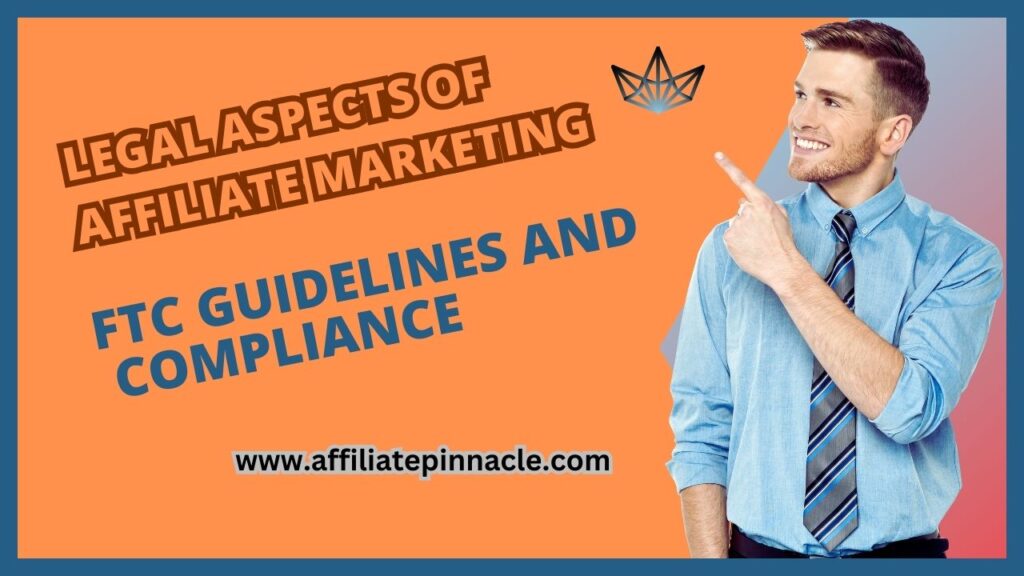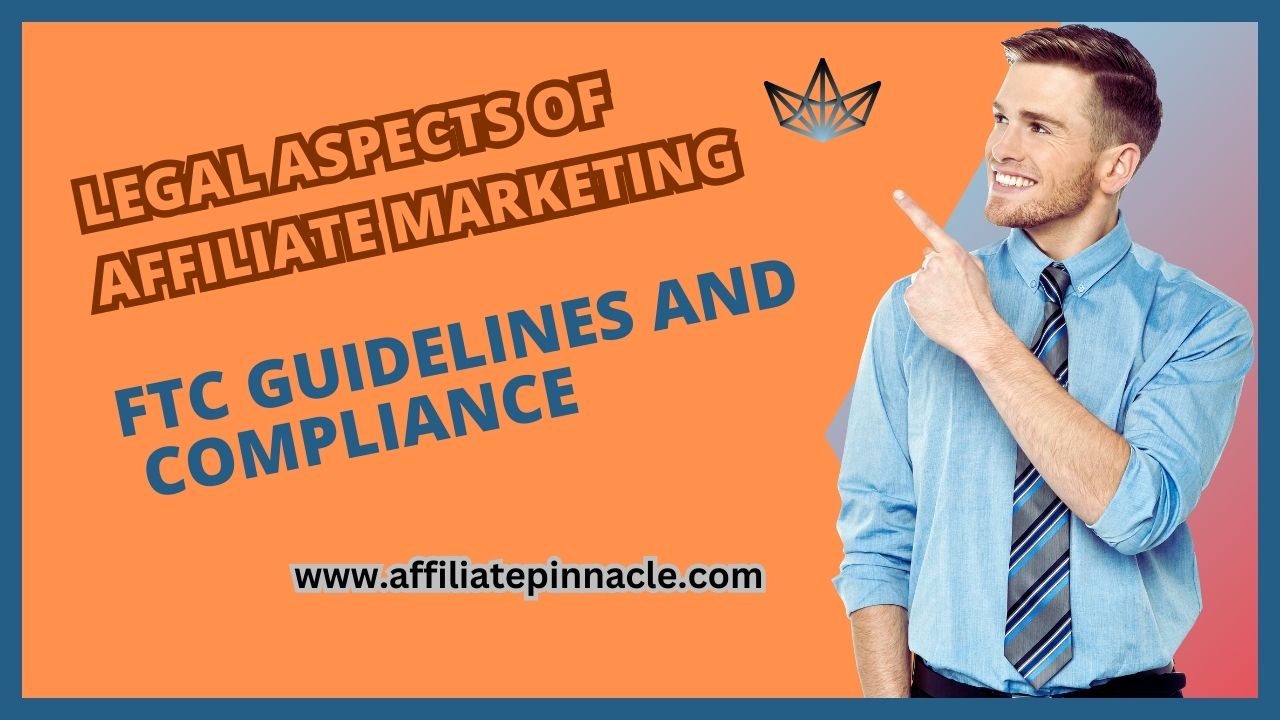Affiliate marketing has become a cornerstone of the digital economy, allowing businesses to reach broader audiences while empowering individuals to earn money online. However, the explosive growth of affiliate marketing has also attracted regulatory scrutiny. To maintain the industry’s integrity and safeguard consumers, the Federal Trade Commission (FTC) has issued guidelines that affiliates and marketers must follow. In this article, we’ll explore the legal aspects of affiliate marketing and delve into the FTC guidelines for compliance.
“Cash Flow Explosion: Start Earning Big Bucks TODAY – Absolutely FREE Training!”
- Disclosure Requirements: The FTC places a strong emphasis on transparency and full disclosure. Affiliate marketers are required to clearly and conspicuously disclose their relationships with the products or services they promote. This means that if an affiliate marketer receives compensation in any form (commissions, free products, or other benefits) for promoting a product, they must disclose this relationship to their audience. The disclosure must be unambiguous and easy to understand, ensuring consumers are aware of the potential bias.
- Endorsement Guidelines: Affiliates need to be careful when endorsing products or services. They are responsible for providing truthful and accurate information about the items they promote. The FTC guidelines emphasize that endorsements must reflect the affiliate’s genuine experiences and opinions. Misleading or false claims can lead to legal repercussions.
- Use of Testimonials and Reviews: Affiliates often use customer testimonials and reviews to support their marketing efforts. The FTC has specific rules governing the use of such content. Affiliates must verify the authenticity of testimonials and reviews and disclose any material connections between the reviewer and the product. Additionally, exaggerated or false claims in testimonials can lead to legal action.
- Social Media and Native Advertising: With the rise of social media, affiliate marketing has evolved to include platforms like Instagram, YouTube, and TikTok. The FTC’s guidelines extend to these mediums as well. Disclosures must be included in posts, videos, or other content to ensure consumers can easily identify affiliate relationships. Hashtags such as #ad, #sponsored, or #affiliate can be used to signal a financial interest.
- Consequences of Non-Compliance: The FTC takes non-compliance with its guidelines seriously. Affiliates and marketers who fail to adhere to these rules may face legal action, monetary fines, and reputational damage. It’s crucial for all parties involved to understand the FTC guidelines and ensure strict compliance to maintain the trust of their audience and the integrity of the affiliate marketing industry.
In conclusion, while affiliate marketing offers a viable income source for many individuals and businesses, it comes with a set of legal responsibilities. The FTC guidelines are in place to protect consumers and maintain the credibility of the affiliate marketing industry. Affiliates and marketers should stay informed about these guidelines, implement disclosure practices, and provide truthful and accurate information in their promotional efforts. Failure to do so can result in serious legal consequences that can be detrimental to both the affiliate’s financial interests and reputation.

Disclosure Requirements
In the ever-evolving world of digital marketing, transparency is paramount. Disclosure requirements, enforced by various regulatory bodies, ensure that consumers are well-informed and protected in their online interactions. These rules are designed to foster trust and prevent misleading practices. In this article, we’ll explore the key aspects of disclosure requirements in digital marketing.
“Cash Flow Explosion: Start Earning Big Bucks TODAY – Absolutely FREE Training!”
- FTC Guidelines on Affiliate Marketing: As mentioned earlier, the Federal Trade Commission (FTC) in the United States sets forth guidelines that require clear and conspicuous disclosures in affiliate marketing. Whether you’re a social media influencer, a blogger, or any form of affiliate marketer, it’s essential to understand these guidelines. You must openly declare your financial interests or relationships with the products or services you’re promoting. Disclosure should be made in a manner that’s easy to notice and understand.
- Sponsored Content on Social Media: The rise of social media influencers and sponsored content has given birth to new challenges. When endorsing products or services on platforms like Instagram, Twitter, or TikTok, influencers must clearly label their posts as advertisements or sponsored content. Using hashtags like #ad, #sponsored, or #paidpartner helps distinguish promotional posts from regular content, ensuring transparency.
- Native Advertising Disclosure: Native advertising, which seamlessly blends in with the surrounding content, presents a unique challenge for disclosure. The FTC requires that native ads are easily identifiable as advertising, even when they mimic the format and style of the platform. Publishers and advertisers must ensure that consumers can distinguish between editorial and promotional content.
- Data Privacy and GDPR: In the European Union, the General Data Protection Regulation (GDPR) mandates transparent data processing. Websites and online services must inform users about the data they collect, how it will be used, and provide users with the option to opt out. Consent banners and clear privacy policies are essential for compliance.
- Sponsored Reviews and Testimonials: When using reviews and testimonials in marketing materials, honesty and transparency are key. If a product review is sponsored or if the reviewer has a financial interest, this information must be disclosed. This prevents consumers from being misled into believing that the review is impartial when, in fact, it’s influenced by financial incentives.
- Native Ads on News Websites: Many news websites include sponsored or native ads that mimic the look of regular news articles. Disclosure is crucial in this context. The FTC requires such ads to be labeled clearly, ensuring that readers don’t mistake promotional content for unbiased news.
- Consequences of Non-Disclosure: Failure to adhere to disclosure requirements can have severe consequences. Regulatory bodies can impose substantial fines on businesses and individuals, and legal action may be taken. Moreover, the loss of consumer trust can be devastating to a brand or influencer’s reputation, potentially leading to long-term damage to their online presence.
In conclusion, disclosure requirements are at the heart of ethical digital marketing practices. By following these rules, businesses, advertisers, and influencers can maintain transparency, protect consumers, and build trust. Staying updated on the specific regulations in your region and implementing clear and conspicuous disclosures in your marketing efforts is essential for navigating the ever-changing landscape of digital marketing. Remember, transparency not only keeps you in compliance with the law but also strengthens your relationship with your audience.
Endorsement Guidelines
Endorsements play a significant role in digital marketing, where influencers, celebrities, and everyday consumers vouch for products or services. However, endorsement guidelines are in place to ensure that these recommendations are honest, transparent, and beneficial for consumers. In this article, we’ll explore the critical aspects of endorsement guidelines in digital marketing.
- FTC’s Focus on Truthful and Accurate Endorsements: The Federal Trade Commission (FTC) in the United States emphasizes the need for endorsements to be truthful and accurate. Anyone endorsing a product or service, whether compensated or not, must provide genuine information based on their actual experience. This means that endorsements should not contain exaggerated or false claims that could mislead consumers.
- Disclosing Material Connections: One of the fundamental principles of endorsement guidelines is the disclosure of material connections. This means that if an endorser has received compensation, free products, or other incentives in exchange for their endorsement, they must clearly and conspicuously disclose this information. The disclosure should be unambiguous and placed in a location where consumers are likely to see it.
- Use of Clear and Unambiguous Language: Endorsement guidelines recommend that endorsers use clear and unambiguous language when disclosing their material connections. This ensures that consumers can easily understand the nature of the endorsement. Phrases like “I was compensated for this review,” or “I received a free product in exchange for my honest opinion” are good examples of straightforward disclosure.
- Comparative Advertising: In some cases, endorsements involve making comparisons between the endorsed product or service and others in the market. Endorsement guidelines require these comparisons to be based on genuine, verifiable information. False or misleading comparisons are not permitted, and endorsers must have access to supporting data if necessary.
- Sponsored Social Media Posts: With the growth of influencer marketing on social media platforms, specific guidelines pertain to sponsored posts. Influencers must use appropriate hashtags like #ad, #sponsored, or #partner to distinguish sponsored content from their regular posts. The FTC also recommends that such disclosures appear at the beginning of the post, ensuring they are visible to users without requiring them to click “read more.”
- Endorsements by Experts: When experts or professionals endorse a product or service in their field of expertise, they should make their qualifications clear. If they have financial interests or other relationships with the product or service they endorse, these must be disclosed. Consumers have the right to know if an endorsement is based on genuine expertise or influenced by financial gain.
- Liabilities for Non-Compliance: Non-compliance with endorsement guidelines can lead to legal repercussions, including monetary fines. The FTC has taken action against companies and individuals who engage in deceptive endorsement practices. Additionally, a loss of consumer trust can be damaging to the reputation of both the endorser and the brand they’re promoting.
In conclusion, endorsement guidelines are designed to maintain honesty and transparency in digital marketing. Adhering to these guidelines is not just a legal requirement but also a way to preserve trust and credibility in the industry. Endorsers, whether they are influencers, celebrities, or everyday consumers, should be aware of these rules and practice ethical and truthful endorsements. Ultimately, building and maintaining trust with your audience is the key to long-term success in the world of digital marketing.
Use of Testimonials and Reviews
Testimonials and reviews have become powerful tools in the digital marketing landscape. They offer a way for consumers to share their experiences with products and services, influencing the purchasing decisions of others. However, to maintain transparency and credibility, there are specific rules and best practices surrounding their use. In this article, we’ll explore the use of testimonials and reviews in digital marketing, including key guidelines for compliance and effectiveness.
“Cash Flow Explosion: Start Earning Big Bucks TODAY – Absolutely FREE Training!”
- The Importance of Authenticity: Authenticity is at the core of using testimonials and reviews effectively. It’s crucial that the content you present accurately represents the experiences of real customers. Faking or manipulating testimonials and reviews can lead to severe consequences, including legal action and significant damage to your brand’s reputation.
- Disclosure of Material Connections: Just like with endorsements, if you have a material connection to the product or service being reviewed, such as receiving compensation or free products, it must be disclosed. The Federal Trade Commission (FTC) and other regulatory bodies require transparency in this regard. Transparency builds trust and prevents deceptive marketing practices.
- Permission and Consent: It’s essential to obtain the necessary permission from customers or users before using their testimonials or reviews in your marketing materials. This can include explicit consent to use their words and, if applicable, their likeness. Without proper permission, you risk legal issues related to intellectual property and privacy.
- Moderation and Monitoring: To maintain the quality and authenticity of testimonials and reviews, it’s crucial to have a moderation and monitoring system in place. This ensures that inappropriate or fraudulent content is not published. Online platforms, especially e-commerce websites, need to take steps to prevent fake reviews from damaging their credibility.
- Response to Negative Reviews: Negative reviews are an inevitable part of online business. Instead of trying to hide or remove them, businesses should embrace these as opportunities for improvement. Responding to negative reviews professionally and addressing the concerns of customers can demonstrate a commitment to customer satisfaction and potentially turn a negative experience into a positive one.
- Provide Context for Reviews: When presenting testimonials or reviews, it’s a good practice to provide context. This can include the date of the review, the specific product or service being discussed, and any relevant details that might help potential customers better understand the review. Contextual information can reduce ambiguity and enhance the credibility of the review.
- Ethical Use of Incentives: Offering incentives, such as discounts or freebies, in exchange for reviews is common. However, businesses should be transparent about this practice and avoid making it contingent on writing only positive reviews. This ethical approach ensures that customers feel comfortable sharing their genuine opinions, whether positive or negative.
- Legal Consequences of Misuse: Misusing testimonials and reviews can lead to significant legal consequences, including fines and litigation. Businesses should understand the laws and regulations related to the use of customer-generated content in their marketing efforts to avoid legal complications.
In conclusion, testimonials and reviews are valuable assets in the digital marketing toolkit. When used correctly, they can build trust, provide social proof, and boost your brand’s reputation. However, it’s imperative to adhere to transparency, authenticity, and compliance with the relevant regulations and guidelines. By doing so, businesses can harness the power of customer feedback while maintaining their integrity and credibility in the digital marketplace.
Social Media and Native Advertising
In the ever-evolving landscape of digital marketing, social media and native advertising have emerged as a powerful duo. Native advertising seamlessly integrates with the content on various social media platforms, offering a non-disruptive and engaging experience for users. In this article, we’ll explore the synergy between social media and native advertising and delve into five key points to make the most of this dynamic combination.
- Blend In, Don’t Interrupt: Native advertising’s beauty lies in its ability to blend seamlessly with the content that surrounds it. On social media platforms, native ads are designed to look and feel like organic content, avoiding the disruptive nature of traditional banner ads. This integration enhances the user experience and fosters a more natural interaction between consumers and brands.
- Relevance is Key: Social media platforms are all about connecting people with content that matters to them. Native ads take this principle to heart by delivering content that is highly relevant to the user’s interests and behavior. Leveraging user data, these ads target specific demographics, ensuring that the content aligns with the users’ preferences.
- Transparency is Crucial: Native advertising should not deceive or mislead users. It’s imperative that these ads are clearly marked as “sponsored” or “promoted” to maintain transparency and inform users that they are engaging with paid content. The use of subtle labels distinguishes native ads from regular posts while maintaining the integrity of the platform.
- Mobile Optimization: With the increasing use of mobile devices, native ads on social media should be mobile-optimized. This ensures that the content seamlessly adapts to various screen sizes and maintains a consistent user experience, regardless of the device used. In the world of native advertising, mobile-friendliness is non-negotiable.
- Engage, Don’t Annoy: Successful native ads don’t just coexist with organic content; they actively engage users. These ads should provide value, whether it’s through informative articles, entertaining videos, or captivating visuals. The content should align with the interests of the target audience and encourage users to interact, such as by clicking, sharing, or commenting.
- Performance Metrics: Social media platforms offer comprehensive analytics and metrics to track the performance of native ads. Advertisers can monitor engagement rates, click-through rates, conversion rates, and other key performance indicators. These insights help refine and optimize ad campaigns for better results.
- A/B Testing: To maximize the effectiveness of native advertising on social media, consider A/B testing different ad elements, such as headlines, visuals, and calls to action. Experimentation and data analysis can reveal which ad components resonate most with your target audience and lead to higher engagement and conversion rates.
- Compliance with Platform Policies: Social media platforms have their own guidelines and policies regarding advertising content. Advertisers must ensure that their native ads comply with these rules to avoid having their campaigns rejected or facing penalties. Familiarize yourself with the specific requirements of each platform you use.
- Sponsored Content Creators: Collaborating with social media influencers and content creators can be an effective approach for native advertising. These individuals have established a rapport with their followers, making their endorsements and sponsored posts highly influential. However, clear disclosure and transparency are crucial in such collaborations.
In conclusion, the combination of social media and native advertising offers a dynamic and effective way to connect with audiences in a natural, non-intrusive manner. By focusing on relevance, transparency, user engagement, and compliance with platform policies, brands can leverage native advertising to enhance their digital marketing efforts and drive meaningful results. When executed thoughtfully, native ads on social media can deliver a powerful punch without feeling like an interruption.
Consequences of Non-Compliance
In the world of business and marketing, rules and regulations exist to maintain ethical standards, transparency, and protect consumers. Failure to comply with these regulations can have severe consequences, including legal actions, financial penalties, and damage to reputation. In this article, we’ll delve into the significant consequences of non-compliance with regulatory guidelines.
“Cash Flow Explosion: Start Earning Big Bucks TODAY – Absolutely FREE Training!”
Legal Action and Regulatory Penalties: Perhaps the most immediate and impactful consequence of non-compliance is the potential for legal action and regulatory penalties. Regulatory bodies, such as the Federal Trade Commission (FTC) in the United States, have the authority to investigate and take legal action against businesses, individuals, or organizations that violate their guidelines. Penalties can range from fines to cease-and-desist orders, or even more severe legal action depending on the severity of the non-compliance.
- Financial Repercussions: Non-compliance can result in substantial financial repercussions. Fines imposed by regulatory authorities can be significant, and the costs of legal defense and potential settlements can further burden the non-compliant entity. In some cases, businesses may also face class-action lawsuits brought by consumers who feel misled or harmed due to non-compliance.
- Loss of Consumer Trust: Trust is a precious commodity in the business world. When consumers discover that a business or individual has not adhered to regulatory guidelines, their trust erodes. This loss of trust can be long-lasting and may result in a loss of customers, reduced sales, and damage to the brand’s reputation. Rebuilding trust can be a challenging and time-consuming process.
- Negative Publicity and PR Damage: Non-compliance with regulatory guidelines often leads to negative publicity. News of legal action or violations can spread quickly through media and social networks, amplifying the damage to a brand’s reputation. Such negative publicity can affect a company’s relationship with customers, partners, and even investors.
- Market Exclusion and Platform Sanctions: Many businesses operate within specific industries or on digital platforms that enforce strict compliance with regulations. Non-compliance can result in being excluded from certain markets or facing sanctions from digital platforms, such as being banned from advertising or using specific features. This can limit a business’s growth and revenue potential.
- Product Recalls and Liability: In some cases, non-compliance can extend to product safety and quality regulations. This can lead to product recalls, which are not only costly but also pose potential health and safety risks to consumers. Non-compliance with safety regulations can also result in liability claims and lawsuits if consumers are harmed by the product.
- Impact on Future Business Opportunities: Non-compliance can hinder future business opportunities, including partnerships, investments, and acquisitions. Companies with a history of non-compliance may find it challenging to attract investors or engage in collaborative ventures. It can also affect mergers and acquisitions, as non-compliance issues become a significant liability in the due diligence process.
- Repetitive Non-Compliance May Lead to Criminal Charges: In severe cases, repetitive or deliberate non-compliance with regulations can lead to criminal charges, such as fraud or deceptive trade practices. Criminal charges can result in fines, imprisonment, and long-lasting damage to one’s personal or business reputation.
In conclusion, the consequences of non-compliance with regulatory guidelines are multifaceted and significant. Businesses and individuals should take regulatory compliance seriously and prioritize adherence to these guidelines as an essential aspect of their operations. It’s not only a matter of avoiding financial penalties but also of preserving trust, reputation, and access to valuable opportunities in the business world.
“Cash Flow Explosion: Start Earning Big Bucks TODAY – Absolutely FREE Training!”
I appreciate you reading my full article,Legal Aspects of Affiliate Marketing: FTC Guidelines and Compliance



